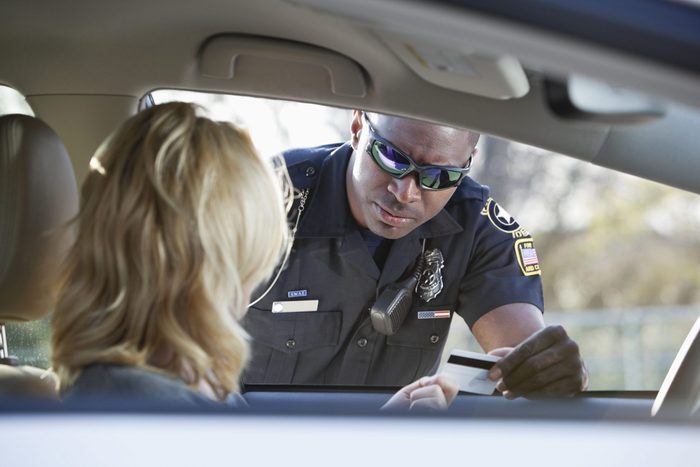
The wrong kind of attention
You saw the lights. You pulled over and waited. Finally, after what seemed like forever, a traffic cop ambled over to your car. Now, they’re peering in through your open window. But before you have a chance to say the wrong thing (or much of anything at all), you’re being asked for your license and registration.
Getting pulled over is a bummer, but one thing police officers want you to know is that routine traffic stops are motivated by a common interest in public safety. In fact, all it takes to justify a traffic stop is reasonable suspicion of any violation of law, including driving just a smidge over the speed limit. Traffic stops happen to the best of us, but they might be more common if you or your vehicle is accidentally attracting negative attention from law enforcement.
Indeed, from the type of car you drive to your supposedly “polite” driving habits that unintentionally put others at risk, there are certain things traffic cops first notice about you. Some can increase your chances of getting pulled over, and others can affect how your encounter with law enforcement plays out—including whether you’re sent off with a warning or a speeding ticket.
Get Reader’s Digest’s Read Up newsletter for more knowledge, humor, cleaning, travel, tech and fun facts all week long.
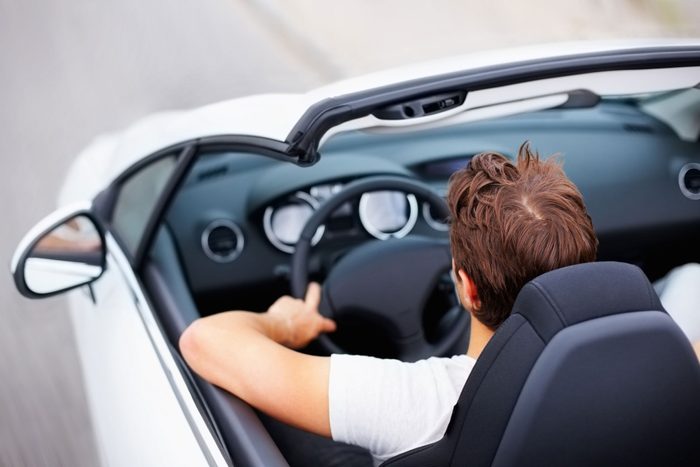
What kind of car you drive
In a perfect world, people wouldn’t judge us by the kind of car we drive. But in the real world, some may draw inferences if you’re behind the wheel of, say, a high-maintenance Porsche, as opposed to a less-pricey car. Obviously, one of the first things a traffic cop will notice about you as you’re speeding along the interstate is what kind of car you’re driving. And guess which kinds of cars tend to get more tickets? Luxury cars.
Whether this reflects an actual bias against luxury cars is debatable. As Lieutenant Jeff Gulick of the Bedford Police Department in New York points out to Reader’s Digest, it’s entirely possible that drivers of luxury cars may actually be committing more traffic infractions than drivers of other cars. And no matter what type of car you drive, the officer who pulls you over will likely touch your car tail light—here’s why.
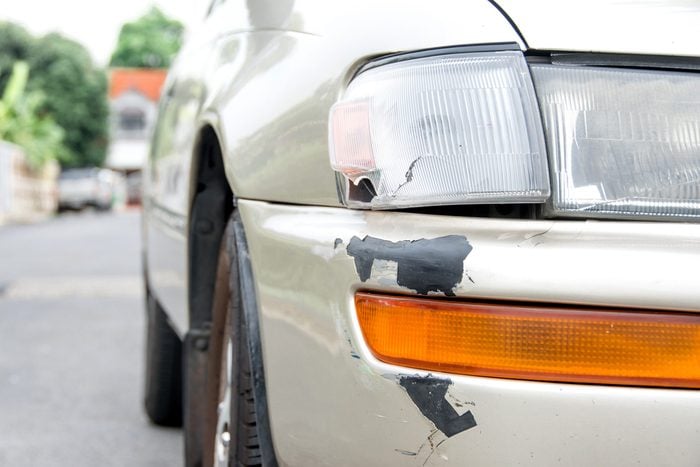
How beat up your car is
Among the things that will get you a speeding ticket besides speeding? If your car is in obvious need of repair, it could attract the attention of police officers, which automatically makes you more likely to get pulled over. One reason: Cops are more likely to find additional issues in poorly maintained cars, including things like a cracked windshield, broken windshield wipers and expired tags.
“Some repair issues, such as broken tail lights and malfunctioning turn signals, constitute safety hazards, whether you’re speeding or not,” notes Lieutenant Gary Holsten of the South Brunswick Police in New Jersey. Fortunately, however, in the case of what Gulick calls “correctable offenses,” you may be able to reduce your penalty by repairing your car within a prescribed time frame (depending on the state in which you’re driving).
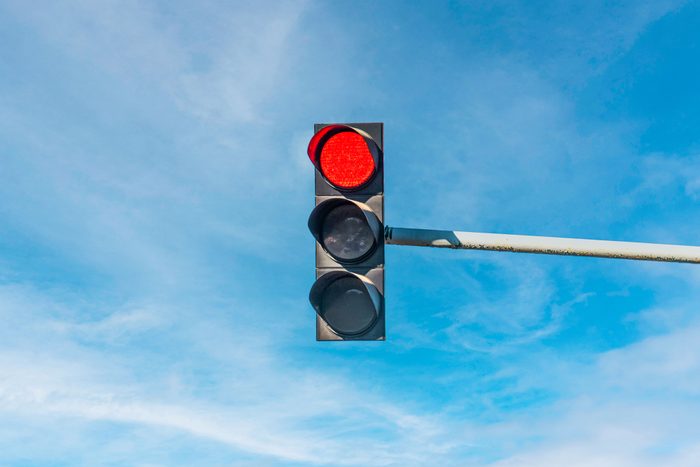
The nature of your traffic violation
One in four drivers breaks a traffic rule every time they hit the highway … but not all traffic violations result in a traffic stop. It’s one thing, for example, to roll through a stop sign; it’s another to plow through a red light at top speed. “Either may constitute a moving violation, but if you’re driving aggressively—speeding, tailgating, swerving between lanes, improperly passing—you’re more likely to get pulled over,” says Holsten. “Ultimately, we’re looking to make the roads safer.”
Plus, the nature of some traffic violations suggests that more may be going on than meets the eye. For example, “excessive speed could suggest a driver is fleeing from the scene of a crime,” explains Gulick. “And weaving between lanes or driving significantly below the speed limit could be a sign of driving under the influence.”
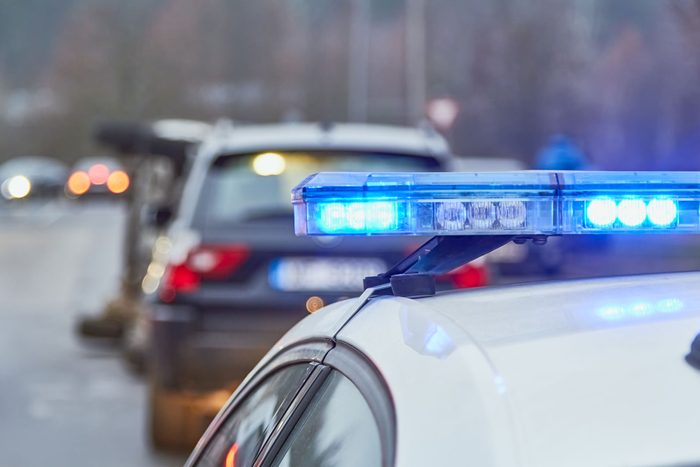
How you respond to those flashing lights
It may seem a traffic stop begins only once you’re being pulled over. But as far as the traffic cop is concerned, by then, it’s already on. And one of the first things they notice is your response to those flashing lights, including how long it takes you to respond.
Sure, it might be a moment before you realize you’re being flagged down. But as soon as you do, here’s what to do, according to Sergeant Christine Jeltema of the Connecticut State Police: “Pull over to the safest spot, preferably to the right side of the roadway, and listen for [law enforcement’s] instructions.” And while you’re at it, consider turning on your hazards. That will signal to law enforcement that you intend to cooperate. In fact, a traffic stop is one of the only times when it’s appropriate to use your hazard lights.
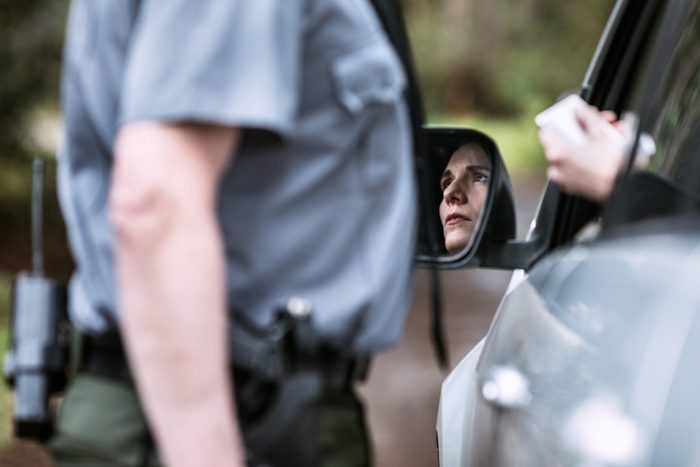
Your demographics
As far as demographics go, traffic cops are “not looking for anything specific,” according to Gulick. Nevertheless, statistics suggest demographics may play some role, or at least that patterns may exist. For example, despite the fact that data suggests that the most dangerous drivers are between the ages of 27 and 42, it’s drivers between the ages of 50 to 64 who are most likely to receive a speeding ticket. Likewise, more women than men report getting speeding tickets … but that doesn’t necessarily mean that men are better drivers than women.
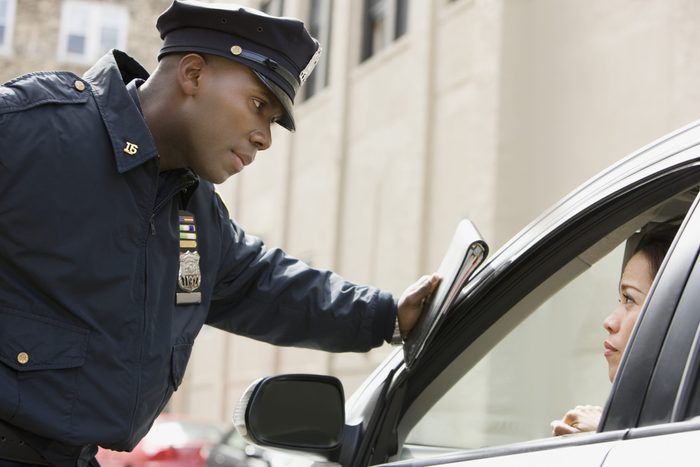
A rude attitude
When you get pulled over by a traffic cop, conducting yourself in a polite manner may or may not get you out of a speeding ticket. But it certainly can’t hurt, says Holsten. By contrast, if you behave rudely toward a traffic cop, it won’t go unnoticed—and that’s highly unlikely to work in your favor. “If you act surly or argumentative during a traffic stop, that’s only going to prolong the whole interaction,” Holsten explains. “And that poses dangers for both the officer and the motorist and the motoring public.”
You might not realize just how dangerous roadside traffic stops can be, but remember that officers are exposed on the road—and speeding cars can be within inches of them, especially on the side of a busy highway. “There are far too many officers struck during traffic stops annually,” Holsten adds, “and motorists have been injured during these incidents as well.”
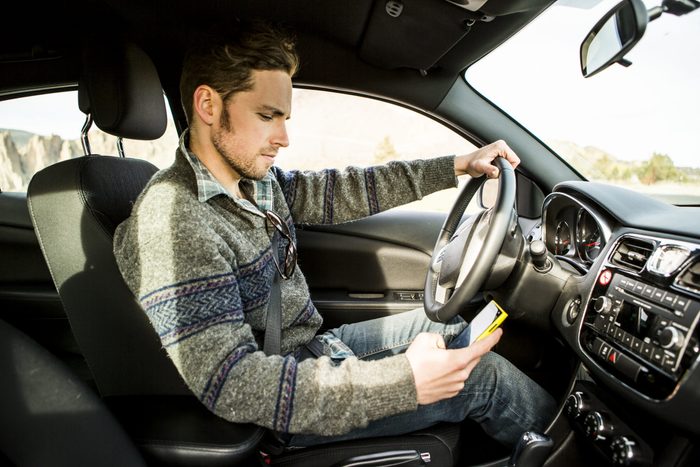
Visible signs of distracted driving
Distracted driving is responsible for 3,000 deaths per year in the United States, according to the National Highway Traffic Safety Administration. No wonder it’s illegal in 48 states. And while texting, talking on or otherwise using your phone while driving certainly qualifies, it’s illegal in 24 states to even hold your phone while driving—regardless of whether or not you happen to be “using it.”
Of course, distracted driving is not limited to cell phone usage. As Gulick notes, depending on the state, “distracted driving can include anything that might keep your mind off your driving, including eating, putting on makeup and driving with your dog on your lap.”
Now, if you’re wondering how traffic cops might know what you’re doing inside your car, Holsten notes that he once observed a driver with a newspaper propped up on the steering wheel! But generally, “drifting out of your lane, late braking and late turns in curves are all signs of distracted driving that can be seen from the road.”
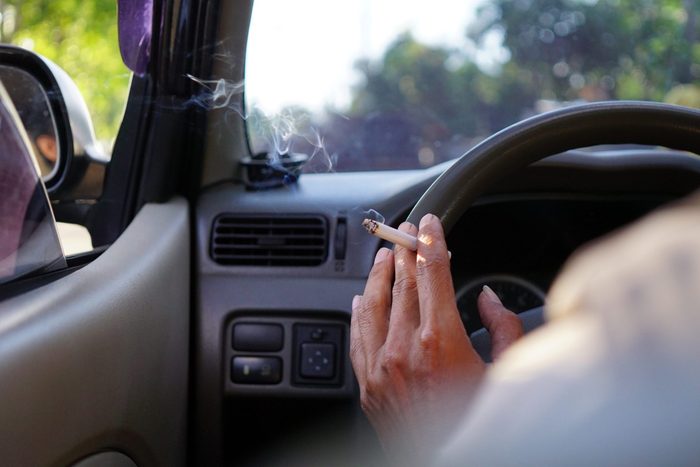
The smell of marijuana wafting from your car
Marijuana has been decriminalized or even legalized in most U.S. states, but that doesn’t mean it’s legal to drive after consuming it. In fact, driving while under the influence of marijuana is illegal in every state. And some state laws go so far as to prohibit having it in one’s vehicle at all—unless it’s enclosed in the glove compartment or trunk.
Since marijuana has a distinct odor, you can bet that a traffic cop will notice if that odor is emanating from anywhere in your car’s interior. “That’s going to enhance or heighten your suspicion,” says Holsten. “It’s no different from walking up to a car and smelling alcohol. At that point, [we’re] going to want to make sure the driver is not impaired.” Then, what might have begun as a routine traffic stop could give way to a full-on search of your car, depending on the laws of the state in which you’re driving.
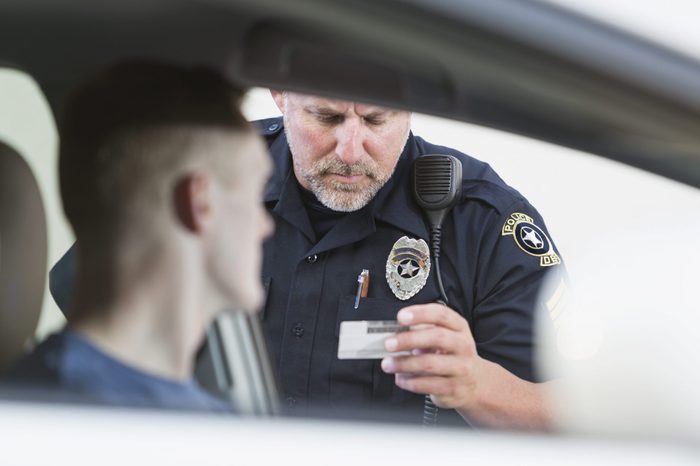
Whether you’re following protocol
Routine traffic stops can be scary—not just for the driver but also for the police officer, according to Gulick. That’s where protocol comes in, and one of the first things a traffic cop may notice about you is whether you’re following along. This entails remaining in your vehicle with your hands where they can be seen and waiting for instructions from the officer before doing anything, including reaching into your glove compartment.
Although you should assume you’ll be asked to produce your license, registration and proof of insurance, it’s best to wait until the officer asks, advises Holsten. “Otherwise, keep your hands on the steering wheel,” he says, “as this will help the officer in assessing any possible safety issues inside the car—things that are being hidden or could be utilized as weapons.”
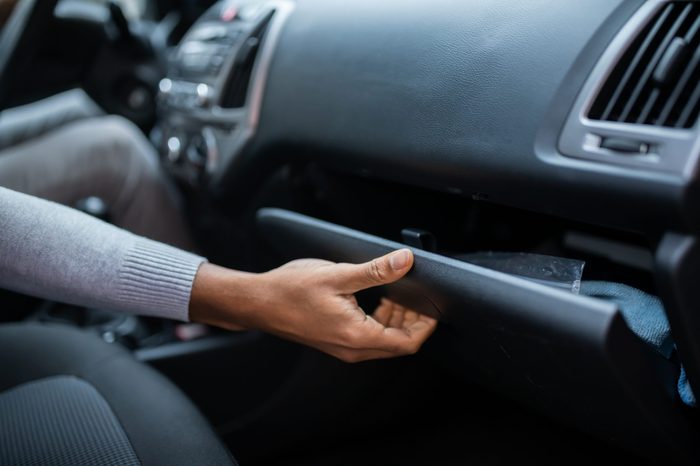
How organized (or disorganized) you are
Once you’ve been asked for your license, registration and proof of insurance, it’s perfectly fine to reach into your pocket, glove compartment or both. But if producing these items creates any sort of fuss on your part, the traffic cop will notice—and not only because it could signal you’re searching for a weapon.
“The more places you are searching, the more you will be shifting your body in the car,” Holsten explains. “The officer’s line of sight into your vehicle is limited to start, and this will most likely cause the officer to have to alter his positioning.” This sort of awkward dance can put the officer in physical danger of being hit by a passing vehicle. By contrast, if you have your documents handy, you’re limiting the officer’s exposure time to passing traffic and the amount of time he has to spend assessing the overall situation.
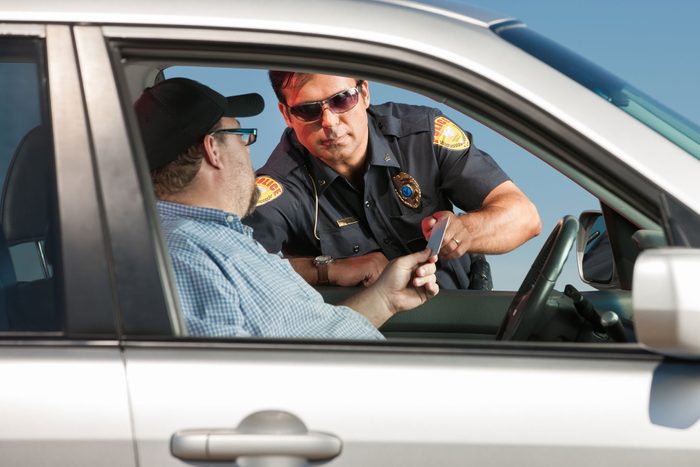
If you’re being evasive
If you’re aware there’s an issue with one of your driving papers, don’t attempt to hide it. “If you know you have an issue with one of the required documents like insurance, driver’s license or registration, it is best to tell the officer straight away,” says Holsten.
Why? Because a traffic cop will pick up on your evasive behavior and your less-than-honest body language. It’s one of the things they’ve been trained to do, and it can set off alarm bells that perhaps the driver is hiding more than just paperwork issues, even when that’s not actually the case.
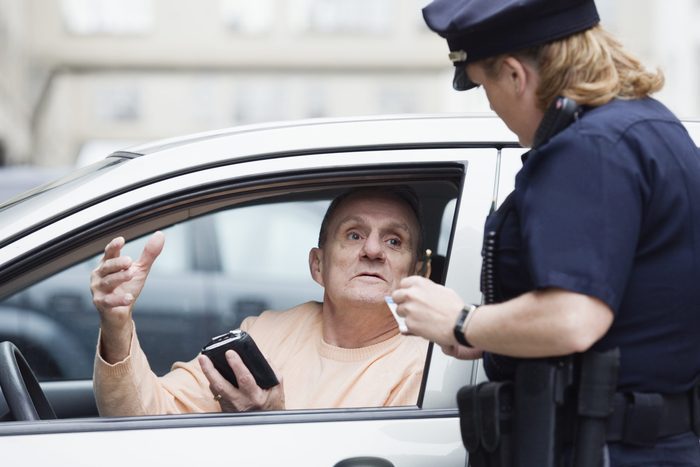
If you try to argue your case roadside
When a traffic cop leans into your driver’s side window and says you were going 40 in a 30-mph zone, you might not want to admit as much. Nor do you have to. In fact, you have the right to remain silent, even at a traffic stop. What you should never do, however, is attempt to argue your case roadside.
If you disagree with a traffic cop, “there are proper procedures to follow,” according to Jeltema, who says that “these include pleading not guilty or filing a complaint.” For clarity, she points out that there will be instructions for how to plead “not guilty” right on the ticket, and complaints can be made through the issuing officer’s agency complaint process. Of course, none of those “proper procedures” involve arguing with an officer as they stand by the side of a busy road.
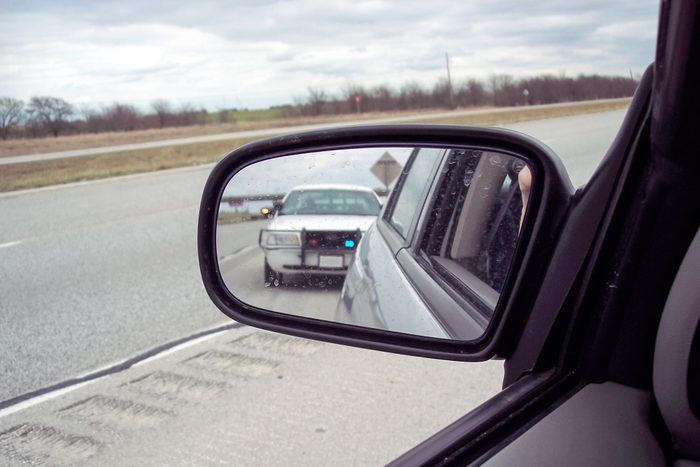
How gracefully you make your exit
If you think it’s over when the officer hands you a ticket and heads back to their vehicle, think again. In fact, it’s only over once you’ve safely made your way back onto the road, and according to Gulick, traffic cops are watching carefully to make sure you do just that. That’s another one of the secrets traffic cops won’t tell you in the moment.
“I always wait for the driver to go before I do,” he says. What is he looking for? Basic compliance with the rules of the road. So if you forget to use your turn signal, you shouldn’t be surprised to see those flashing lights go back on.
Additional reporting by Tamara Gane.
About the experts
- Lieutenant Jeff Gulick has been working in law enforcement for 15 years, and for the last 10, he has been with the Bedford Police Department, serving Bedford Hills, Bedford Village and Katonah, New York.
- Sergeant Christine Jeltema is a member of the Media Relations Unit of the Connecticut State Police. She has been a law enforcement officer since 2005.
- Lieutenant Gary Holsten is in his 24th year with the South Brunswick Police in New Jersey. He also serves as vice president of the New Jersey Police Traffic Officers Association and as an instructor for the Practical Traffic Engineering for Police Officers course at Rutgers University.
Sources:
- Insurify: “Generations with the Best and Worst Drivers (2020)”
- Bigger + Harman, APC: “High-Profile Cars: Do They Get More Tickets?
- Forbes Advisor: “Distracted Driving Statistics & Facts in 2023”
- DISA: “Marijuana Legality by State – Updated Aug 1, 2023”
- Connecticut Department of Transportation: “Connecticut Department of Transportation Issues a Reminder as Retail Cannabis Sales Begin: Driving High Equals a DUI”
- ACLU of New York: “What to Do If You’re Stopped by the Police”
